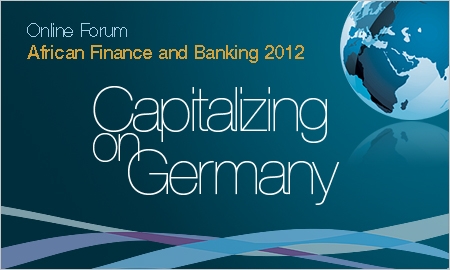
COMING SOON a special feature produced by Globus Vision to be distributed with Financial Times Deutschland
Finance and Banking Sectors of the African Economies
Numerous studies have shown that financial development is intrinsically linked to economic growth across all sectors. The financial sector underpins economic growth in Africa and also benefits from growth across all sectors of the economy. In most African countries, the finance sector withstood the global crisis quite well because of its low exposure to the type of high-risk financial products commonly traded in OECD markets. Growth in sub-Saharan Africa has averaged 5% in the last two years.
The financial sector can therefore play an important role in channelling existing resources into productive investment so as to stimulate growth, create employment and provide individuals and companies with basic needs. It should therefore play an important role in attracting foreign investment to the whole economy, because it is the main beneficiary of a dynamic and fast-growing market.
Southern Africa
The transformation that has taken place in Southern Africa in the past 15 years has been astonishing. From its struggling past, the region has become a major powerhouse in the international arena through important institutions such as the Southern African Development Community. This report will analyze the key role that the public and private sector has had in transforming the regional economy. It will be the definitive overview of the actors who are fostering the region´s growth and have placed it at the forefront of Africa’s development, giving it an unmatchable prestige worldwide. We will portray the effort and hard work of dedicated individuals and companies that have moved the region forward and helped to make Southern Africa a global competitor.
East Africa
According to recent economic reports, East Africa's banking assets are steadily increasing and will continue to do so. The East African states are seeing vast potential for growth within their financial sectors, due to new projects being developed across virtually all sectors of their economies. Economic integration has brought forth numerous developments and advantages to the five members of the East African Community: Burundi, Rwanda, Kenya, Tanzania and Rwanda, on top of the trade agreements that have stimulated business within the region. With the proposed East African Federation of 2015, many argue that this will lead to even greater benefits for the member nations.
West Africa
With the establishment of ECOWAS and UEMOA, economic integration and promotion of competitiveness among all sectors of the economy were immediately a plus for all nations involved. West African banks have also increasingly gone global in their operations throughout recent years, opening offshore branches or establishing foreign affiliates. Rapid innovations in financial markets and the internationalization of financial flows have changed the face of banking almost beyond recognition.
Technological progress and deregulation have provided new opportunities for an increased competitive pressures among banks and non-bank financial institutions
Northern Africa
With over a quarter of the top 200 banks in Africa, the Northern African region of the continent is seeing significant advances in the finance sectors of each country, largely due to reforms, modernisation initiatives and economic incentives from foreign players.
GERMANY & AFRICA
Austerity measures in the United States, Europe, and China are crowding out investments in those countries. As a result, German investors are becoming more interested in emerging markets, particularly in Africa. Among western world economic powers, one has remained robust and thriving throughout the global financial crisis, and is now leading Europe´s economic policies: Germany. The world’s fourth largest economy is stronger than ever and has emerged relatively unscathed from the economic global crisis, thanks to its manufacturing and industrial might and sound fiscal principles. Germany is the most reliable investor in the world these days. Led by the most powerful woman in the world, Chancellor Angela Merkel, Germany sees the value in investing in Africa. During 2012, , the chancellor has been visiting countries throughout the continent along with a business delegation constantly declaring “Germany is interested in investment and trade, not just to give aid to Africa.”| “Germany is interested in investment and trade, not just to give aid to Africa” Chancellor Angela Merkel |
Regional integration and its implications
Most African countries are involved in a process of regional integration; some of these could even lead to a common market and a monetary union. This process will also have positive consequences in the capital markets through closer collaboration of the entire continent’s Stock Exchanges, increased competitiveness and more liberalised trade unions.
Banking sector business opportunities
The opportunities in doing business with Africa’s finest are immense. Currently, nearly 95% of the 500 million adults living in sub-Saharan Africa earning less than $10 a day do not have access to proper banking solutions. The need for financing major infrastructure development and projects across various sectors is tremendous. We will focus on some banking products that have a very important presence in Africa, such as mobile banking and microfinance.
Insurance sector incentives
With a 13.8 percent yearly growth in premium income between 2001 and 2010, Africa’s insurance industry (excluding South Africa) has witnessed remarkable growth. Currently, there are 1 billion people across the continent without insurance coverage, so the opportunities are clear. Globus Vision will study the level of development of the insurance sector, its challenges and opportunities, and how it enables economic growth and social development.
Capital Markets
Africa's relative attractiveness as an emerging market has led to an improvement in foreign investment, with a concomitant increase in the number of bourses now operating on the continent. The African stock market is resurgent and displaying an energy that had not been seen in a long time. The continent has become a friendlier and more profitable market. Foreign investors have learned during the previous crisis that Africa indeed stayed stable. Africa is an investment opportunity, not just a destination for development assistance.
0 COMMENTS